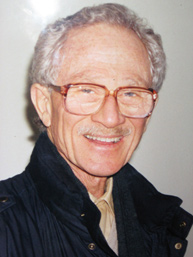Early warnings for international earthquakes
Early warnings for international earthquakes McGill University
User Tools (skip):
Early warnings for international political earthquakes

BRECHER: Conflict’s Richter
If there were a system for measuring the world's political upheavals and their aftershocks, which would rank higher – the Cuban Missile Crisis or the stare down between nuclear-armed India and Pakistan over Kashmir?
It's the kind of question Michael Brecher has been asking – and answering – for years. Brecher, McGill's R.B. Angus Professor of Political Science, considers it his academic raison d'être to chart the escalation, climax and resolution of international military-security crises.
"One of the major threats to our survival is the inability of nations to cope with crises, especially those involving nuclear states, and to avoid war," says Brecher. "Since I was 11, I've seen it too many times. I've seen it in the Middle East and South Asia over and over."
"International Political Earthquakes" is the term Brecher coined for these nation-shaking events. It is also the title of what he hopes will stand as his magnum opus: a massive book scheduled for release this summer.
"An international crisis in the field of world politics is the equivalent of an earthquake in geology," Brecher said. In the book, "it's more than just a metaphor – I've also constructed a 10-point scale that goes beyond the Richter scale, as it describes the impact or fallout in addition to the severity or intensity of the earthquake."
Thirty-three years after launching the International Crisis Behavior Project (ICBP), and still marching on with yet another entourage of graduate students, Brecher said this book may well be his "last word" on the project.
Brecher's colleagues and graduate students have mined history books and journals to build systematic summaries and extract raw numbers related to 445 crises that have occurred worldwide since 1918. Besides drawing on this compendious knowledge base for the book, Brecher said his group did 29 in-depth case studies. "Few other books have done more than three," he said. "And they are all related to one country."
Brecher and ICBP co-founder Jonathan Wilkenfeld of the University of Maryland blended their academic strengths – qualitative case studies and quantitative data analysis, respectively – to strike a rare balance. As a result, the ICBP reveals distinct patterns and commonalities in crisis behaviour. One insight that runs counter to conventional wisdom is that people, regardless of culture, belief system, language and other differences, cope with crises in essentially the same way.
"It is taken for granted that the Chinese act differently than Canadians under the stress of an international political earthquake," Brecher said. "They don't."
A second revelation is that the quality of decision-making by political leaders during international crises isn't diminished by the stress of the crisis itself. Political leaders will search for information and weigh options in a rational manner.
Members of the ICBP hope their work can help people prevent history from repeating itself. Nevertheless, tensions still escalate into crises and conflicts, despite what experts like Brecher have learned from the patterns of history.
"The real tragedy," Brecher said, "is the inability to build a bridge between those who make political decisions and those who are constantly studying them and discovering patterns of behaviour."
The Kashmir conflict between India and Pakistan that has sparked three wars since 1947 was the subject of Brecher's 1953 PhD dissertation. That was the start of his more than two decades of study and six books on South Asia.
In moving his focus to the Arab-Israeli conflict, Brecher attempted to provide guidance to decision makers, an "early warning system" to abort earthquakes.
"In 1975, I toured Egypt, Syria, Jordan, and Israel, interviewing figures including Boutros Boutros-Ghali, the Henry Kissinger of Egypt and future United Nations Secretary-General. It was clear Egypt was ready for peace. In Israel, I lectured the foreign ministry, 'Gentlemen, there is no doubt in my mind that Egypt is ready to make concessions and move towards peace.' "
Brecher remembers one Israeli official's reaction. "Michael, what a pity – you've been brainwashed!"
"But two years later, President (Anwar) Sadat was in Israel," declaring his intentions for peace. Despite regular disappointments in the peace process, Brecher remains optimistic that "one day there will be a breakthrough."
The UN relies on the ICBP database when crafting crisis policy and interventions. But there may be more promise in Brecher's 8,000-plus former students, many of whom now hold positions of responsibility internationally.
"I constantly get letters from people I taught over 25 years, ago saying they still remember what I taught them."
At least somebody is learning.

